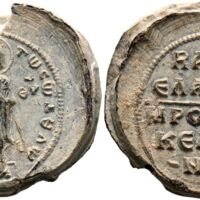Basil metropolitan of Keltzene
Reference Description
Basil metropolitan of Keltzene, Circa 1071-1072. Seal or Bulla (Lead, 28 mm, 20.98 g, 11 h), a. +ΘΚΕ ΒΟΗΘ, ΤΩ CΩ ΔΟΥΛ/ MHP-ΘV The Virgin, robed, veiled and nimbate, standing facing, turned slightly to the left, holding the infant Christ on her right arm. Rev. -.-/BACIΛ/ ΕΛΑΧΙCTΩ/ ΜΡΟΠΟΛΙΤ,/ ΚEΛΤΖΗ/-ΝΗC- in six lines within dotted border. BZS.1947.2.51 (same reverse die) = DO Seals 4, 66.1. Laurent V/1 812. Beautifully preserved, sharply struck, well-centered and extremely attractive. The best known example. Minor scuffs, otherwise, good extremely fine.
The full inscription, starting on the obverse and continuing to the reverse, reads: Mother of God, help your servant-Basil, most humble metropolitan of Keltzene.
The city, which is known as Keltzene in Greek, was anciently named Acilisene, probably originally Erez, and was called Yekeghiats or Yerznka in Armenian; it is now the Turkish city of Erzincan. In around 387 Theodosius I and Shapur III signed the Treaty of Acilisene, which divided Greater Armenia between the Romans and the Sasanians. The city became Christian during the reign of Tiridates III due to the efforts of St. Gregory the Illuminator, who was, of course, responsible for christianising Armenia in 301. Acilisene/Keltzene had become a bishopric by at least the mid 5th century (a bishop Ioannes is known from 459). For a while the city was known as Justinianopolis, but that name soon fell into disuse. By the 10th century it was the seat of an archdiocese and in the 11th it had become a metropolitan see. Its religious importance ended with the crushing Byzantine defeat at Manzikert in 1071, but it remained a flourishing, primarily Armenian, town for centuries thereafter: it was visited by William of Rubruck in 1254 and, later in the century, by Marco Polo. The city\'s Armenian and Christian history ended in 1915 with the massacre of its remaining non-Muslim population by Ottoman forces and the destruction of its churches.
The full inscription, starting on the obverse and continuing to the reverse, reads: Mother of God, help your servant-Basil, most humble metropolitan of Keltzene.
The city, which is known as Keltzene in Greek, was anciently named Acilisene, probably originally Erez, and was called Yekeghiats or Yerznka in Armenian; it is now the Turkish city of Erzincan. In around 387 Theodosius I and Shapur III signed the Treaty of Acilisene, which divided Greater Armenia between the Romans and the Sasanians. The city became Christian during the reign of Tiridates III due to the efforts of St. Gregory the Illuminator, who was, of course, responsible for christianising Armenia in 301. Acilisene/Keltzene had become a bishopric by at least the mid 5th century (a bishop Ioannes is known from 459). For a while the city was known as Justinianopolis, but that name soon fell into disuse. By the 10th century it was the seat of an archdiocese and in the 11th it had become a metropolitan see. Its religious importance ended with the crushing Byzantine defeat at Manzikert in 1071, but it remained a flourishing, primarily Armenian, town for centuries thereafter: it was visited by William of Rubruck in 1254 and, later in the century, by Marco Polo. The city\'s Armenian and Christian history ended in 1915 with the massacre of its remaining non-Muslim population by Ottoman forces and the destruction of its churches.
Provenance
Nomos 22 Lot 422
21.06.2121
21.06.2121
Collection
Citation
“Basil metropolitan of Keltzene,” Armenian Numismatic Research Organization, accessed January 22, 2025, https://armnumres.org/items/show/1268.


